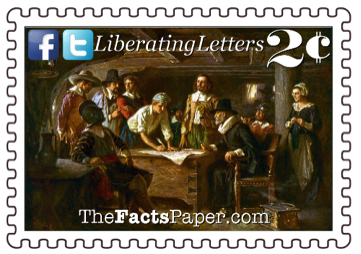November 21, 2016
Dear Liberty,
Most consider the U.S. Constitution as the formation of our government. Actually, the freedom of self-governing was established 150 years earlier in Plymouth, Massachusetts. The Mayflower Compact, America's first founding document, reveals the pilgrims' true purpose and intention for their journey to the New World.
The Mayflower voyage was coordinated by William Bradford and the Separatists, or “Saints”, but they couldn't do it alone. Needing both physical and financial assistance, they accepted extra travelers on their adventure. About half of the Mayflower passengers were tradesmen, adventures and servants, or “Strangers”, who were seeking their own opportunities. The Saints sought religious freedom while the Strangers sought economic freedom. (see Thanks Be To God)
Bad weather forced the Mayflower to travel north of its Virginia destination. They landed at Plymouth, which was outside Britain's jurisdiction. The First Pierce Patent, which granted the pilgrims the right to settle in the New World, was now void. This planted the idea in a few Strangers of completely breaking free from the king. While some continued to respect the monarchy, others gave speeches of mutiny towards it. Bradford knew a consensus must be reached by all before stepping onto land if they all wanted to survive. They needed to organize as one “civil body politic” until a new patent could be granted by the king.
Using both the Old and New Testament as guides, Bradford drafted what is now known as the “Mayflower Compact”. All male passengers of age were required to sign the document before leaving the ship.
First and foremost, the document acknowledged God. They still were in awe of King James, as is evident by the use of "dread", respecting him as God's chosen ruler for Britain. Their desire was to break from the Church of England and worship God as they saw fit. (see England's Luther) After stating their purpose of advancing the Christian faith, the contract bound the Saints and the Strangers together under an agreed upon government.
AMERICA'S FIRST FOUNDING DOCUMENT

The Mayflower Compact
(in full modern text)
In the name of God, Amen. We, whose names are underwritten, the loyal subjects of our dread Sovereign Lord King James, by the Grace of God, of Great Britain, France, and Ireland, King, defender of the Faith, etc. Having undertaken, for the Glory of God, and advancements of the Christian faith and honor of our King and Country, a voyage to plant the first colony in the Northern parts of Virginia, do by these presents, solemnly and mutually, in the presence of God, and one another, covenant and combine ourselves together into a civil body politic; for our better ordering, and preservation and furtherance of the ends aforesaid; and by virtue hereof to enact, constitute, and frame, such just and equal laws, ordinances, acts, constitutions, and offices, from time to time, as shall be thought most meet and convenient for the general good of the colony; unto which we promise all due submission and obedience.
In witness whereof we have hereunto subscribed our names at Cape Cod the 11th of November, in the year of the reign of our Sovereign Lord King James, of England, France, and Ireland, the eighteenth, and of Scotland the fifty-fourth, 1620.
According to the document, it was signed on November 11, 1620. That date shifted when the world changed from the Julian Calendar to the Gregorian Calendar. (see As Time Goes By) We recognize November 21st as the official date by today’s calendar.
In 1621, King James signed a new Pierce Patent, giving the pilgrims his blessing and freedom to self-govern. The Mayflower Compact remained valid until the northeast organized the Dominion of New England in 1686. A hundred years later, the Mayflower Compact would be used as a template for the Constitution. In an 1802 speech, John Quincy Adams credited the Mayflower Compact as the basis of the U.S. Constitution. The son of Founding Father President John Adams, he is also a descendent of John Alden, the last surviving signer of the Mayflower Compact. (see Standing Tall)
The original Mayflower Compact went missing and has never been found. Many presume it was looted during the Revolutionary War. Fortunately, there were other publications of it. Bradford provided the text to Edward Winslow in London for the booklet Mourt's Relation: A Journal of the Pilgrims at Plymouth, which was published in 1622. Bradford also recorded the document in his book, History of Plymouth Plantation. Nathanial Mortion, Bradford’s nephew, included the text along with the list of signers, in New England's Memorial, published in 1669.
The Compact was America’s first call for freedom. It demonstrates our Christian heritage and values.
There is no doubt the pilgrims were Christian people with the desire to freely worship God as well as spread the Good News of Jesus Christ to the New World. They were not ashamed to profess their devotion to God. Liberty, standing up for your faith is not always easy, but it is always worth it.
That’s my 2 cents.
Love,
Mom


